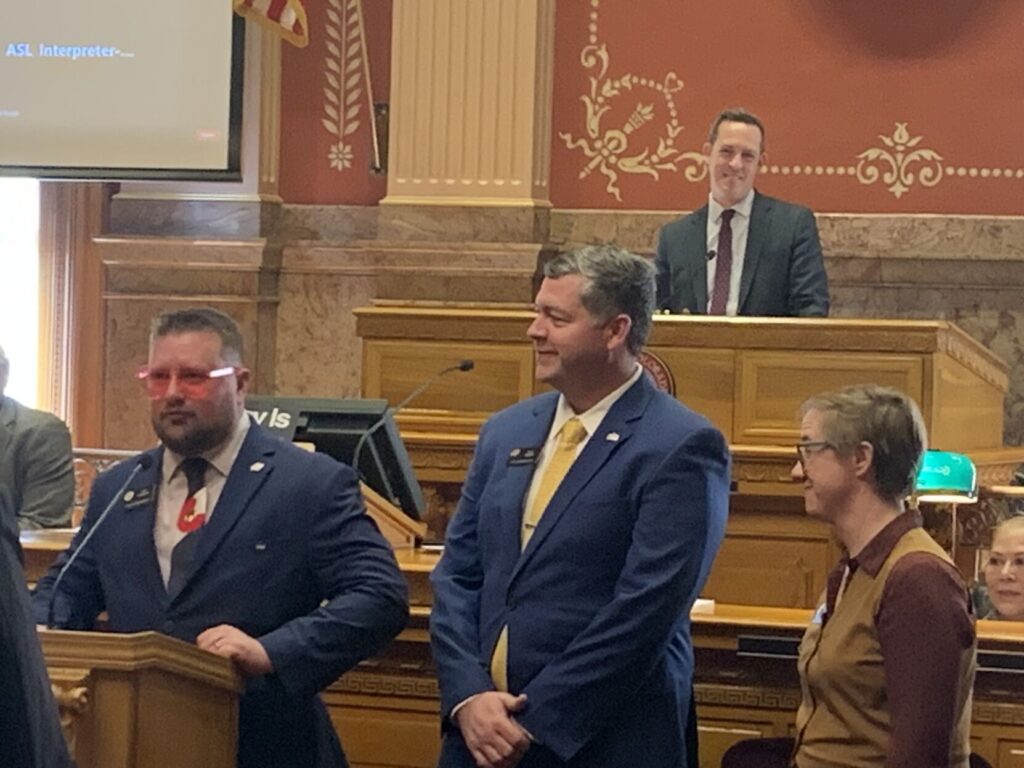Doug Bruce has day in court, with more ahead

This story has been corrected. Please see correction below.
Round 2 of the alleged probation violation charges against Taxpayer Bill of Rights author Doug Bruce landed in Judge Sheila Rappaport’s Denver District Court on Monday. Another round is scheduled for August 31, and yet another, complete with fresh charges, is likely to follow that.
Bruce has been under supervision for three years by the Colorado Probation Office, since he served a sentence for criminal tax evasion. Bruce wasn’t convicted of pocketing moneys for his own use. Instead, he donated his salary as an El Paso County commissioner to several tax-exempt, political non-profit organizations. Failing to pay taxes on this pass-through, prosecutors argued, cheated the state of tax revenues, while bolstering the contributions enjoyed by the recipients of his largesse. Bruce has called this an invented legal theory of “criminal philanthropy.” If a corporation had been found executing similar transfers, it almost certainly would have been handled as a civil matter, he maintained.Nonetheless, Bruce was charged with criminal intent. At one point, the IRS indicated it found that no crime had occurred. The state, however, soldiered on with its case. A jury agreed with the prosecution and Bruce was sent to prison, eventually paying $54,000 in restitution. He was referred for probationary supervision to the Economic Crimes Unit, although some maintained it wasn’t an economic crime – there are no victims other than the Colorado Department of Revenue, no malicious fraud, no theft, no injury to innocent third parties.
Monday’s hearing was a continuation of the attorney general’s charges, which surfaced in April, that Bruce violated the terms and conditions of his probation.
The attorney general’s case was delayed as Bruce, representing himself in the proceeding, asked Judge Rappaport to instruct Denise Laugesen, a Colorado Springs blogger, to stop harassing him. An altercation with Laugesen following Bruce’s April 10 hearing led to assault charges against Bruce that were later dismissed. The judge said she could not require courteous behavior anywhere other than within her court but admonished Laugesen to behave professionally.
When Monday’s hearing got under way, prosecutors told the court they didn’t expect to take more than 15 minutes with each of three scheduled witnesses. This estimate didn’t account for the extensive cross examinations Bruce would conduct, which extended the hearing for three hours without leaving any time for his defense.
First, some background on Bruce’s probation officers: Mary Ellen Lord, a 17-year veteran of the probation division, and a specialist in economic-crime supervision, was initially assigned to the Bruce case. She was soon replaced by Marianne Clementi from El Paso County, where Bruce resides, but not before several spirited conversations with Bruce regarding the terms and conditions of his probation. He argued over whether a requirement to report all contracts included purchase of food, gas, clothing and necessities. Lord advised Bruce these should be accounted for in his monthly budget summaries. She reported there had been no problems for nearly two years.
Then, in February 2014, Lord was contacted by someone named Dennis O’Hare, who said he couldn’t complete a real estate purchase because Bruce wasn’t depositing his checks. This triggered alarms, since it implied Bruce might have been entering into business contracts and failing to fully report his income. Lord asked Wendy McKenzie, a fiscal and forensic investigator with the probation division, to mail a financial disclosure form to Bruce. McKenzie said she did this but didn’t send it by certified mail, as she usually does, because she had been advised that certified letters wouldn’t be delivered to a post office box. In a twist, she was transferred to another position in Fort Collins the same day the forms should have been returned to her in Denver. Advised of the inquiry, Clementi asked Bruce during a regular meeting whether he had filled out the disclosure forms, but he told her he hadn’t received them. O’Hare, who had been advised to talk with Clementi, never called her and has apparently vanished into thin air. Bruce asked Lord whether she would be surprised to learn he didn’t know anyone named O’Hare and, as his subsequent financial disclosures have shown, never deposited any checks from him.
A few months later, Clementi received an anonymously delivered, inch-thick binder containing copies of documents showing Bruce had been issued a traffic ticket from the El Paso County Sheriff’s Department. The documents also showed he sold his late mother’s condominium in a complicated transaction that transferred ownership to Colorado Springs City Councilwoman Helen Collins, with half the proceeds going to his brother. Neither event was reported to Clementi. Bruce apparently had dodged a question earlier from Clementi about contacts with the police on the grounds that sheriff’s deputies aren’t, technically, police. Meanwhile, he challenged the ticket and was found not guilty. The sheer volume of documents in the binder raised suspicion that the anonymous complainant could be someone in local government, observers have said, noting that Bruce has engaged in legal brawls with both the city and county. An outstanding judgment for $21,000 was collected from the escrow account following the sale of his mother’s condo. Another judgment, however, for $7,600, for legal fees as part of another lawsuit that had been deemed frivolous, wasn’t collected because of the transfer of title to Collins. That judgment was filed the day after the transfer, but almost certainly must have been anticipated, court watchers surmised. Bruce is set for another court date at the end of August to explain how that all transpired.
Prior to this week’s hearing the attorney general’s office advised the court that additional violations might have occurred since April. In one instance, an anonymous caller, this time from Ohio, complained that Bruce hasn’t replaced a missing downspout on a rental property as part of his maintenance obligation as a landlord. Court observers speculated on Monday that there would be no reason to introduce this latest allegation if there weren’t concerns that the previous charges are shaky, at best. Apparently nothing untoward was found in Bruce’s bank statements and fiscal disclosure when it was recently filed, so court observers were left to openly speculate why the state continues grasping at straws. Clearly, Bruce is reviled in many political quarters, and could be facing a seemingly endless stream of charges. But, it isn’t against Colorado law to be unpleasant, nor, some would say, is probation supposed to be an exercise in chasing down technicalities to exact further punishment on an offender who has served his time.
This story has been corrected to reflect that Denise Laugesen is a Colorado Springs blogger and not, as the Statesman columnist originally wrote, a reporter for the Colorado Springs Gazette. We regret the error.
Editor’s note: During a recess, columnist Miller Hudson told Bruce that certified mail notices have been routinely delivered to his professional and personal post office boxes. Hudson was called near the end of the hearing to testify that he was baffled by McKenzie’s testimony regarding her decision not to use certified mail to notify Bruce.
Miller Hudson is a public affairs consultant and a former state legislator. He can be reached at mnhwriter@msn.com.














